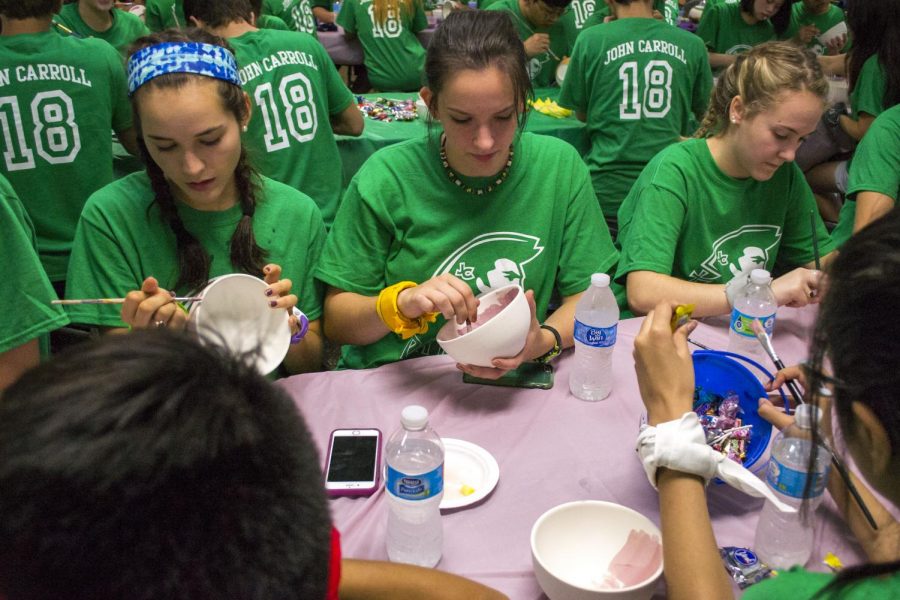Required service discourages growth
With a 60-hour community service graduation requirement, students find themselves struggling to learn from service
Seniors Laura Amrhein, Abby Bryant, and Caitlyn Trent paint bowls during Senior Unity Day on Friday, Sept. 22. More service opportunities should be offered where students have the opportunity to bond during the activity.
The way community service is approached at JC strips it of its true value. When taking part in any kind of service, you should be able to appreciate the joy of sharing both your material possessions and talents with others. Service needs to come from a place of compassion within us, not just a desire to satisfy graduation requirements.
Service is a reality for every JC student. Each student must complete 60 service hours, including 20 direct hours in order to graduate.
The hours themselves have always been emphasized. Freshmen are taught in Freshman Seminar, now called Patriot Transitions, that you should have 15 hours by the end of your freshman year, and 15 more by the time your sophomore year is over. If you don’t have 40 hours by the end of your junior year, your schedule for your final year at JC won’t be released to you.
This is the same punishment as someone who doesn’t turn in one of their Maryland State Department of Education (MSDE) textbooks. And like turning in these books, community service is just another item for students to check off their to-do list.
Some students even forge their community service forms because so much emphasis has been placed on the number of hours students have accumulated, not the value of their experiences and dedicating themselves to others.
“I have lied on my service forms before, but only so I can get the hours I need. It’s stressful to make room for service with school and everything else, and when I do get hours, I never remember to turn them in before 30 days when they don’t count anymore,” one anonymous sophomore said.
As a community, we need to come to realize that the value of service does not come from how much time we spend doing something, but how much we dedicate ourselves to the outreach when we do get the chance.
In order to reemphasize the importance of dedicating ourselves fully to others, JC should implement service project days with a different activity for each grade level.
This kind of community service policy is based off of existing ones at other Catholic schools such as Cardinal Gibbons High School in North Carolina where previous Campus Minister Gary Meyerl now works as the Director of Outreach.
At Cardinal Gibbons, the freshmen volunteer at low-income day care centers, sophomores spend a day at a soup kitchen, juniors visit senior citizens in assisted living facilities, and seniors volunteer with the Construction Crew for Habitat’s ReStore, a program similar to Habitat for Humanity in Harford County.
This framework for a new system of community service is simple enough to copy, and would easily translate into outreach opportunities in the community around us.
A similar opportunity already exists at JC for the sophomores who go and spend a day at Mount Zion to visit with disabled adults as they assist in the Beyond Capernaum program.
Making the switch to one mandatory service day from the current requirement of 60 hours would make students much less likely to shy away from service.
For one thing, service is always more fun when you do it with a friend, and sending students in a group ensures they will have peers to interact with during their outreach experience.
This approach to service also creates a set time for student’s community service to fit into their often busy schedules. They won’t have to worry about squeezing it in somewhere in between school, practice, or homework.
Most importantly, this could make the graduation service requirement something people actually enjoy doing. An opportunity to spend a day fully dedicating yourself to those in need would already be built into your education.
You would be able to take part in service not just to check off another item on a to-do list so you can graduate, but so that you can experience the true benefit of dedicating yourself to others.



